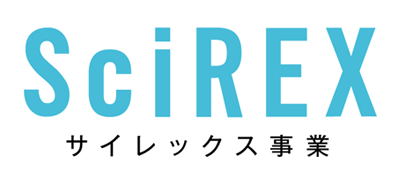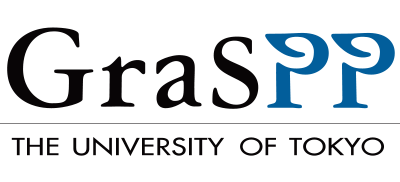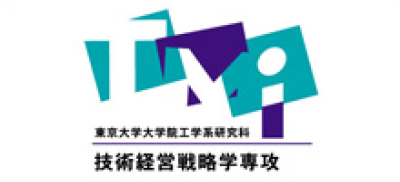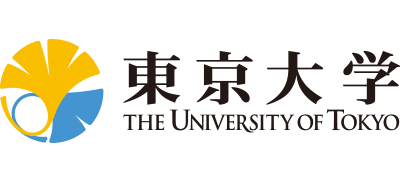E1: Space Policy
STIG students Thomas Kruse and Charleston Ambatali were awarded at the annual SciREX Summer Camp, held at the National Graduate Institute for Policy Studies (GRIPS) on 2-4 September 2022, and co-organized by Kyushu University.
With their research on the development of a space policy for Pacific Islands, Thomas Kruse (STIG), Charleston Ambatali (STIG) and Muhammad Azlan (GRIPS) won the first prize in both categories of the SciREX Award. The first category is judged and awarded by MEXT officials and the second one by professors of SciREX members universities. They also got the third place for the People’s Award, based on a vote of the audience.
Their award-winning policy proposal will soon be featured by the Asia Pacific Oceania Space Association (APOSA), a leading regional NGO promoting youth engagement and collaboration in the Asia-Pacific and Oceania space sector.
The group was mentored by STIG Assistant Professor Quentin Verspieren during the SciREX Summer Camp.
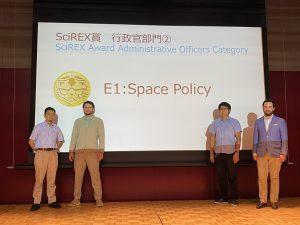 |
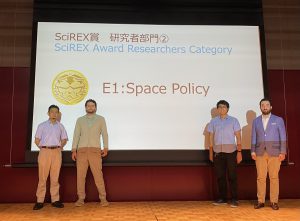 |
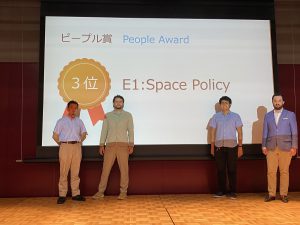 |
Other STIG prominent students were also featured as below:
[SciREX Award: by the MEXT]
J6: Development of advanced human resources and their diverse activities: Kotaro Nakamura
[Co-Evolution Award]
J2: Realization of a decarbonized society through discussion with various stakeholders: Manabu Fujita, Momoko Kurosawa, Kouhei Teraoka
J5: Data utilization and its social acceptance: Takumi Yamada
[People’s Award]
J6: Development of advanced human resources and their diverse activities: Kotaro Nakamura
———————————–
◆Background
The Science for RE-designing Science, Technology Innovation Policy (SciREX) program was established in 2011, with its HUB at the National Graduate Institute for Policy Studies (GRIPS) and Core Centers at the University of Tokyo, Hitotsubashi University, Osaka/Kyoto universities, and Kyushu University. Since then the program has since been promoting international standard research and training. It provides training in evidence-based policymaking for individuals who will lead the new research area of Science for Science, Technology and Innovation (STI) Policy; connect policy and research; and promote basic research in relevant fields. One of the program’s key activities is the annual Summer Camp where faculty members and students from SciREX member universities gather to share each university’s SciREX exercises, discuss the topic of the year, present the results of that discussion, and exchange information across a variety of academic fields. In 2022, Summer Camp was held IN PERSON, overcoming the actual coronavirus situation.
◆Summer Camp 2022 Theme: “Policy Making with Consideration of Diverse Values.”
Developments in information technology, globalization, increasingly aged society, and energy issues are challenging every society. We are now working to respond to major innovations and challenges that could change our way of lives. Policies that address these issues may have a major impact on people’s lifestyles, and it is becoming increasingly important that policymakers earn the trust and understanding of the public. The theme this year is a practical examination of means of formulating and implementing policies based on scientific evidence, while at the same time effectively communicating with stakeholders who have different values, viewpoints, and ways of thinking.
◆General Information
Date: September 2 (Fri)-4 (Sun), 2022
Venue: National Graduate Institute for Policy Studies (7-22-1, Roppongi, Minato-ku, Tokyo 106-0032)
Hybrid with Zoom was partially performed.
Sponsors: Research and Development Bureau Research and Development Strategy Division, Science and Technology Policy Bureau, Ministry of Education, Culture, Sports, Science and Technology(MEXT), SciREX Core Centers, SciREX Center
Planning and Management: SciREX Summer Camp 2022 Committee/CSTIPS @Kyushu University/SciREX Center and GiST @GRIPS
Language: [1st day Orientation & 3rd day Final presentations]
Simultaneous interpretation between Japanese and English was provided.
◆List of Group Work Themes
E1: Space Policy
E2: Citizen participation concept in policy making process
J1: Future Vision of Support for the Elderly and Lifestyle Changes
J2: Realization of a decarbonized society through discussion with various stakeholders
J3A: Energy strategies that take diverse values into account
J3B: Energy strategies that take diverse values into account
J4: Social change through startups
J5: Data utilization and its social acceptance
J6: Development of advanced human resources and their diverse activities
J7: Education for a Diverse Society and a Lifelong Learning Society
